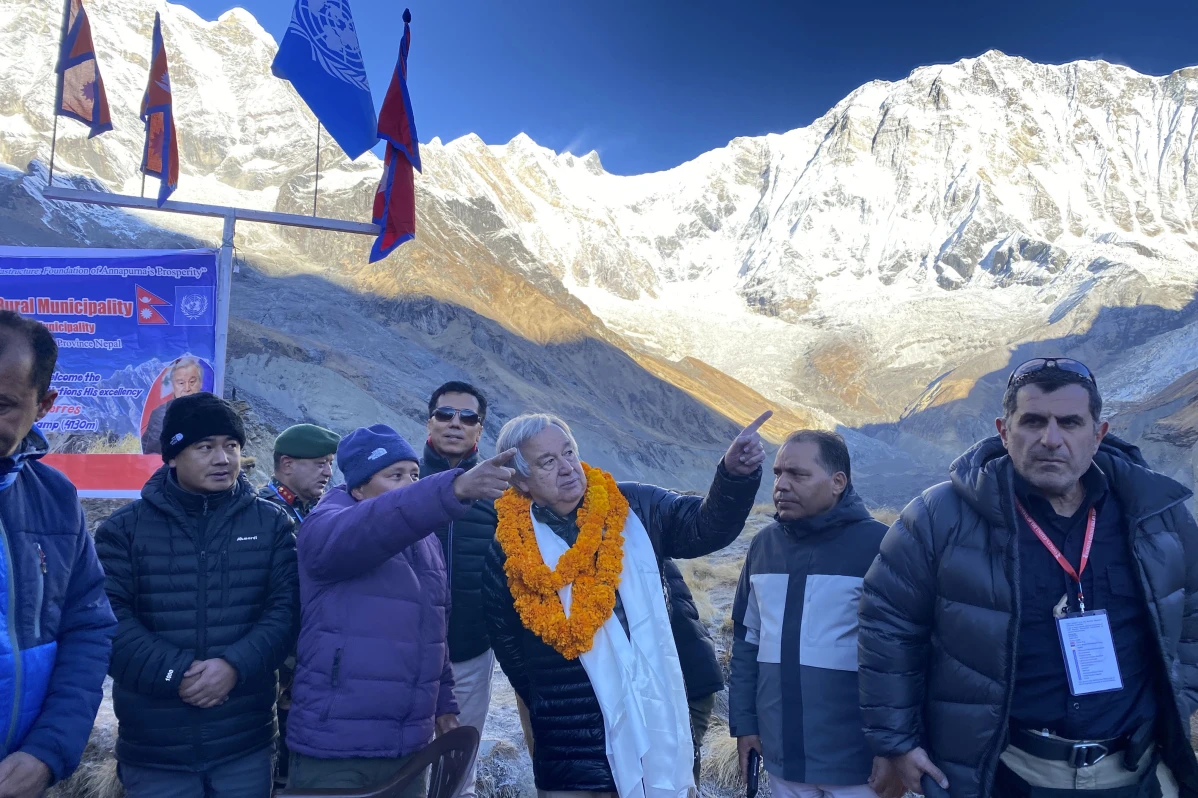Climate Resilience in Nepal: A Wake-Up Call for Urgent Action




UN Secretary- General Antonio Guterres chief visits tallest mountains in Nepal and expresses alarm over their melting glaciers. Picture credit: AP
Climate change poses the most immediate threat to humanity, and its impacts are already being severely felt by fragile mountain nations like Nepal. Global greenhouse gas emissions, driven largely by industrialised nations, have created profound injustices: countries like Nepal, with minimal emissions, are facing the brunt of environmental consequences. Melting glaciers, unpredictable monsoons, increased glacial lake outburst floods (GLOFs), droughts, and landslides are all contributing to the loss of life, livelihoods, and biodiversity.
In this context, the Centre for Nepal Studies UK (CNSUK) hosted a timely and powerful session as part of its monthly webinar series, featuring Dr Ganga Ram Dahal, an international consultant with the FAO of the United Nations. His presentation, titled “Climate Crisis in Nepal Calls for Urgent Actions to Build Resilience”, outlined the alarming trajectory of climate-induced changes and offered a compelling case for urgent, co-ordinated response at all levels.
Dr Dahal situated Nepal’s challenges within the broader context of the global “triple planetary crisis” of climate change, biodiversity loss, and pollution. Citing recent data and UN reports, he emphasised that climate change is the most urgent concern globally and particularly acute in the Himalayan region. Dr Dahal drew on the Theory of Himalayan Environmental Degradation to explain how ecological fragility in the region is being rapidly exacerbated by climate change.
Notably, 2024 marked the first full calendar year with global temperatures exceeding 1.5°C above pre-industrial levels, placing additional pressure on Nepal’s already stressed ecosystems.
He also highlighted the political and economic challenges of climate response, noting that while Nepal has introduced policies such as the National Climate Change Policy and the National Adaptation Plan (NAP), implementation remains weak. Fragmented data, institutional limitations, and unequal access to international climate finance have hindered progress. He cited an important Green Climate Fund (GCF)-supported project in the Churia region as a case of resilience-building, though still modest in scope compared to the scale of need.

Lokendra Purush Dhakal
The presentation concluded with a strong call to action: climate governance must be strengthened, finance must be mobilised, and communities must be empowered to lead adaptation. Dr Dahal advocated for integrating local knowledge systems, promoting climate-smart agriculture, and developing gender-responsive policies as essential elements of Nepal’s resilience strategy.
Dr Dahal’s contribution to the webinar was evaluated as both scholarly and urgent. His ability to interweave data, policy analysis, and field-level insights offered attendees a rich and multidimensional understanding of the climate crisis in Nepal. His clarity, depth, and vision made the session particularly valuable for academics, policymakers, and diaspora communities alike. The Centre for Nepal Studies UK acknowledges this presentation as a significant addition to the ongoing discourse on environmental justice and development in Nepal.
I had the opportunity to moderate this webinar, which was part of CNSUK’s continued commitment to knowledge exchange and civic responsibility. The Centre also extends its sincere appreciation to the Nepal Dialogue UK team, whose leadership and collaboration have been instrumental in shaping this impactful platform.
– Lokendra Purush Dhakal, Executive Director, Centre for Nepal Studies UK
सम्बन्धित सामग्रीहरू
हाम्रो सिफारिस
- १
- २
- ३
- ४
- ५











